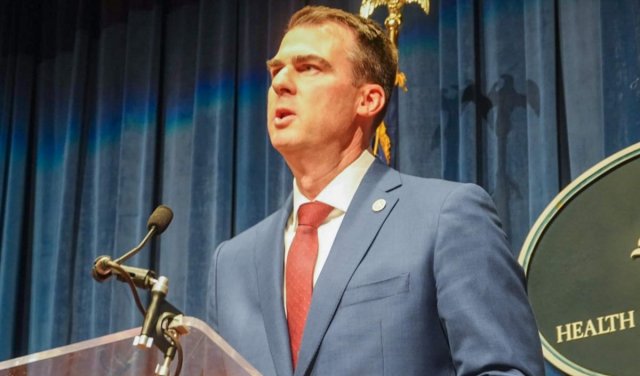
WASHINGTON — Governor Kevin Stitt announced on Thursday his support of a Trump administration Medicaid plan that would permit block grants to fund an Oklahoma health care plan he called SoonerCare 2.0.
Stitt’s plan would focus on capturing additional federal funds available under Medicaid while pursuing the maximum flexibility offered by the Centers for Medicare and Medicaid Services’ newly proposed Healthy Adult Opportunity initiative. Stitt said he wants to deliver personal responsibility, innovate the rural health care system and deliver reform across the entire Medicaid program in the state.
“We’ve been studying the best practices in all 50 states, and we’ve learned a lot about what is working and what isn’t. (…) Every state has their unique challenges, their unique climates, and their own cultures,” Stitt said. “That is why the Trump administration’s announcement today is a game changer. My administration has been working on SoonerCare 2.0 to capture our total federal dollars under Medicaid in a way that is more stable and accountable.”
This story was reported by Gaylord News, a Washington reporting project of the Gaylord College of Journalism and Mass Communication at the University of Oklahoma.
Back in Oklahoma, House Speaker Charles McCall (R-Atoka) quickly endorsed Stitt’s new plan and called it preferable to the straightforward expansion of Medicaid eligibility proposed in State Question 802, which will appear on a 2020 Oklahoma ballot.
“Our caucus appreciates Gov. Stitt’s strong leadership working with the Trump administration to bring federal dollars back to Oklahoma,” McCall said. “At first glance, the governor’s plan swiftly brings our federal dollars home to help Oklahomans in a far more responsible fashion than the state question. The state question forces the Obamacare federal model upon states, and the Trump-Stitt plan puts states in charge of their own health care and health outcomes.”
Under the proposed CMS program, Stitt’s plan resembles what is commonly known as a block grant to fund projects or programs with fewer federal requirements and restrictions. Medicaid block grants have been blocked in the past by Congress.
“There will be some negotiations we do with [CMS] on whether we do a per-person total expenditure that we get from the federal government or if it’s going to be a total amount,” Stitt said.
Because Trump’s new program is an optional demonstration initiative, Stitt said it offers a great deal of flexibility with the focus of allowing states to figure out what works best for their people.
Stitt said he plans to establish moderate SoonerCare premiums with the hope of transitioning to private health insurance coverage. He said he wants to expand targeted treatment for opioid addiction and substance abuse, and he said he wants to establish work requirements that encourage Oklahomans to “be engaged in activity that advances their personal potential — whether it be education, certification programs, work, or community involvement.”
Democrats concerned by Medicaid block grants
With at least seven rural-Oklahoma hospitals closing in the past 10 years and nearly 30 percent at risk of closing, rural health care has been a hot topic in Oklahoma politics. Stitt’s proposed SoonerCare 2.0 is no exception.
Stitt discussed the need for a focus on Oklahoma’s rural needs last fall when his administration previously said they expected to roll out an alternative to SQ 802. Their vision included enhancing provider reimbursement, authorizing telehealth services and reimagining “hospitals” to expand care options to parts of the state with scarce populations.
U.S. Rep. Kendra Horn (D-OK5) said expanding Medicaid in some fashion in Oklahoma is a priority.
“Over the past decade in Oklahoma, we have had seven hospitals close across our state,” Horn said. “This impacts the health and safety of individuals and it impacts the overall health of our community.”
But in a tweet Thursday afternoon, Horn expressed her concerns over the new plan.
“Over 500,000 children rely on SoonerCare for health care access,” she said. “Block grants put them in danger of losing access to the providers in their communities and to the lifesaving medications they need. That is the wrong direction for our state.”
In Oklahoma, House Democrats agreed. House Minority Leader Emily Virgin (D-Norman) and Rep. Forrest Bennett (D-OKC) released a joint statement.
“A serious health care plan provides access to health care to all Oklahomans, does so in a way that is equitable to all citizens and is proven to improve health care outcomes,” Virgin and Bennett said. “It seems the governor’s plan fails on all three of these points. Under block grants, lawmakers will determine care, not doctors, and unnecessary red tape will limit services amongst the lowest-paid workers in Oklahoma, who also have the highest tax burden.”
The two House Democrats said Trump’s newly proposed Medicaid block grants have not been tested.
“A straight expansion of Medicaid would invest in services that we know work in other states and in Oklahoma,” they said. “Finally, a direct expansion has gone through the court process, while the governor’s plan has not. Oklahomans are tired of waiting on their government to do what is right. A straight expansion of Medicaid is the easiest way to increase access to health care in the state, and it has been proven to work in other states.”
Background on Medicaid expansion battle
In a SoonerPoll from July 2019, 56.3 percent of Oklahomans surveyed said they were in favor of Medicaid expansion. SQ 802 also seems to have strong support specifically, though the measure places the income eligibility requirement in the Oklahoma Constitution.
Stitt called the state question a “straight-up, clean Medicaid expansion,” which he is opposed to.
“It’s the wrong approach,” Stitt said. “Amending our (Oklahoma) Constitution to force Medicaid expansion [is] wrong and will be ineffective and will fail to fix our problems.”
But after a record 299,731 signatures were counted by state officials for SQ 802, it’s up to Stitt to pick which ballot will feature the question during the 2020 calendar year.
Stitt said he will probably choose one of the summer statewide election dates or the November general election. By that time, he said he hopes his SoonerCare 2.0 plan could be on its way to being implemented.
SQ 802 would add provisions to the Oklahoma Constitution requiring the state to expand coverage. Specifically, this would include people between the ages of 18 and 65 who are not currently covered and have an annual income at or below 133 percent of the federal poverty line as calculated under federal law.
Additionally, SQ 802 would mean the state could not create further restrictions on eligibility for Medicaid recipients.
According to the Kaiser Family Foundation, 36 states and Washington, D.C., have expanded their Medicaid programs, leaving Oklahoma as one of 14 states that have yet to follow suit.






















